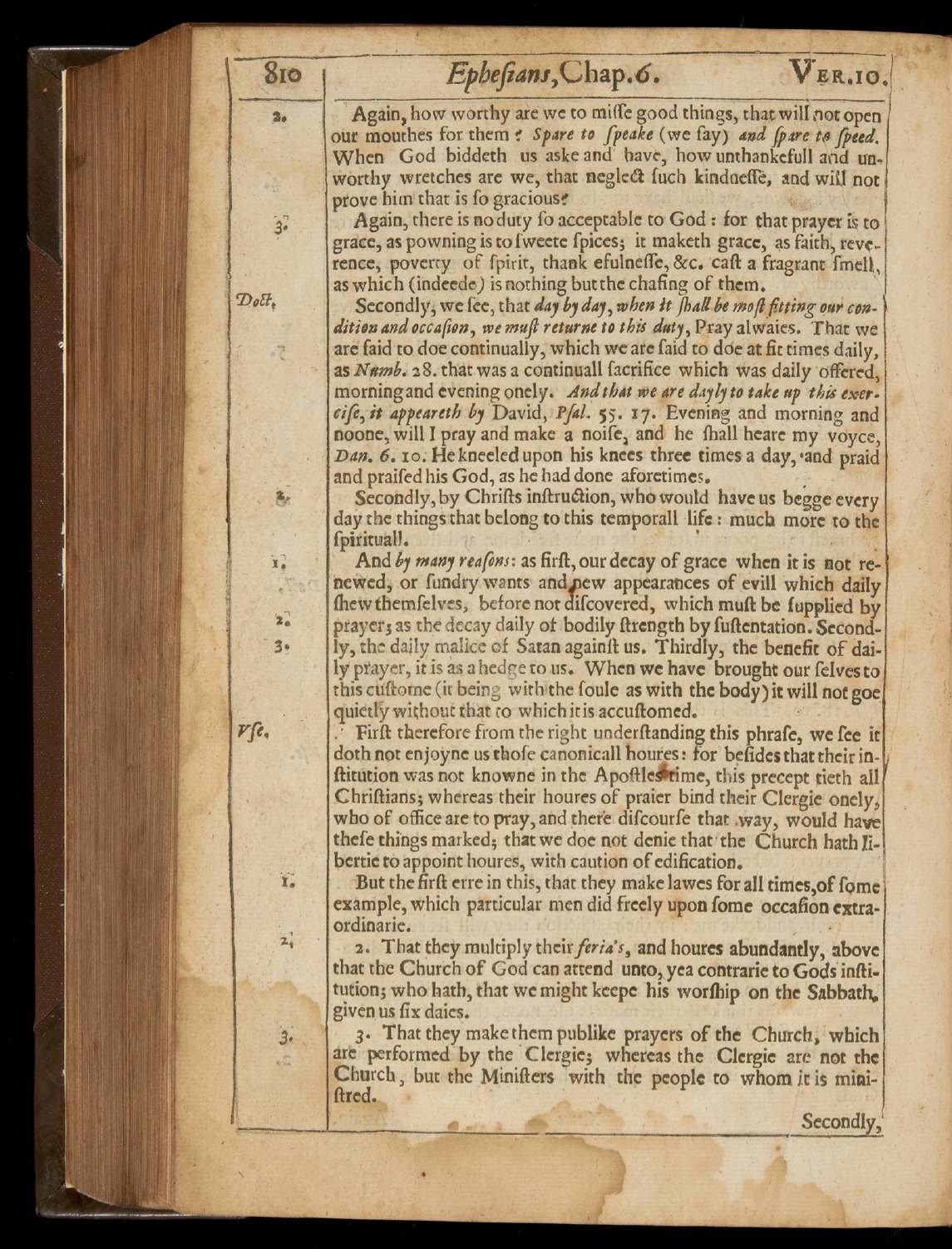

81:o
I
F'phefianr,Ghap.6.
V
ER,IO,
3.
Again, how worthy
are
we to
mi(fe
good things, that
will
not
open
our mouthes for
them
Spare
to
fpeake
(we
fay) and
fare
to fpeed.
When God
biddeth
us aske
and have,
how
unthankefull
and
un-
worthy wretches
are
we, that
negleil
fuch kindnetfe, and will
not
prove him
that
is
fo
graciousf
Again, there
is
no duty
fo
acceptable to
God
:
for
that
prayer
is
to
grace,
as
powning
is
to
f=ete
fpices;
it
maketh grace,
as
faith,
reve,
rence, poverty
of
fpirit, thank efulneffe, &c. caft
a
fragrant finell,
as
which
(indeede)
is
nothing but
chafing
of
them.
Doti`,
Secondly, we
fee,
that
day
by
day, when
it
/hall
be
moll
fitting
our con-
dition and
occafion,
we mufé
retur
»e to
this duty,
Pray
alwaies.
That
we
are
faid
to
doe continually, which
we are
(aid
to
doe
at
fit
times daily,
as
Numb.
a
8.
that
was
a
continuall facrifice
which
was daily offered,
morning
and evening
onely.
Andthat
we
are
dayly
to
take
up
this exer-
cifi,it
appeareth
by
David,
Pfal. 55.
ry.
Evening and
morning
and
noone,
will
I
pray and make
a
noife,
and he (hall heare
my voyce,
Dan.
6.1o.
He kneeled upon his knees three times
a
day,
.and
praid
and praifed
his
God,
as he
had
done aforetimes.
Secondly,
by Chrifls
inftruEtion,
who
would have
us
begge
every
day
the things that
belong
to
this temporali
life
:
much more to the
fpirituall.
And
by
many reatons: as
Hilt,
our
decay
of
grace when it
is
not
re-
newed, or
fundry wants
andiew
appearances
of
evill
which daily
thewthemfelves, before not difcovered, which mutt be
fupplied
by
prayer;
as
the
decay daily
of bodily tirength by futtentation. Second-
3.
ly, tha
daily malice of Satan againft us.
Thirdly,
the benefit
of
dai-
ly prayer,
it is as
a
hedge
to
us.
When
we have
brought our
felves
to
this cutlornc
(it
bein
with the
foule
as
with the
body)
it will not goe
quietly
without that
to which iris
accuflomed.
Vfe.
Firft
therefore from the right underftanding this phrafe, we
fee it
doth
not enjoyne
us
thofe
canonicall houres: for betides
thattheir
in-
flitution
was
not knowne
in
the
Apoftleigtime, this precept tieth all
Chriftians; whereas
their houres
of
praier
bind their Clergie onely,
who
of
office
ate to
pray,
and
there difcourfe
that
way,
would
have
thefe things marked;
that
we doe not denie
that the Church
bath
Ii
-,
bertie
to
appoint houres, with caution
of
edification.
t,
But the
firft erre
in
this, that they make
lawes for all
times,of
fume
example, which particular men
did
freely upon fome occafion extra
-
ordinarie.
a.
That
they multiplytheir
ferias,
and houres
abundantly,
above
that
the
Church
of
God
can
attend
unto,
yea
contrarie
to Gods
infli.
tution;
who
path,
that
we
might
keepe his
worfhip on the Sabbath,
given
us
fix
daies.
3
3.
That
they make them publike prayers
of
the
Church,
which
are
performed
by
the Clergie; whereas
the
Clergie are not the
Church,
but the Miniflers with the people to
whom it
is
mini
-
ftred.
Secondly,
AMR

















